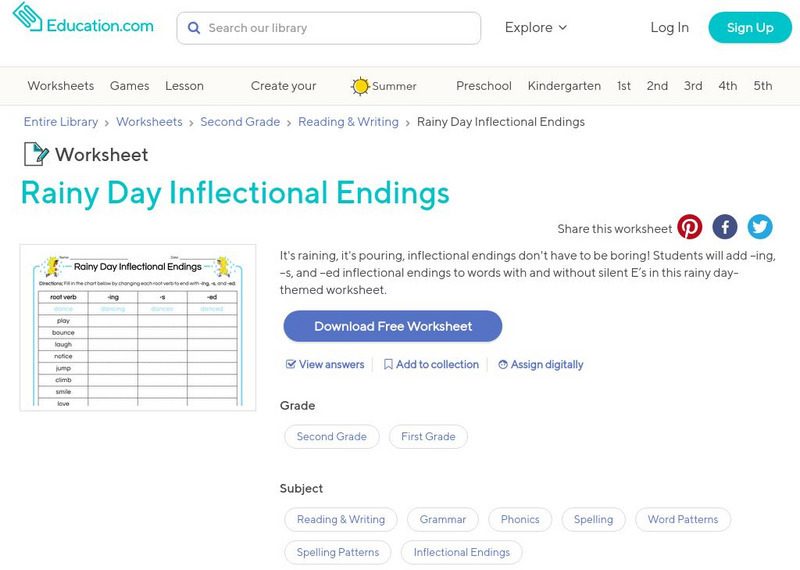Curated OER
Acting on the Farm
Second graders are assigned reading and acting parts by drawing out pieces of paper with an animal. They find their group by making the sound of the animal once everyone has drawn a paper. They then read and choose parts within their...
Curated OER
Cemetery Geology
Students examine the chemical and physical weathering process of different rocks in a cemetery based on dates on the stones. Students discover the susceptibility of different rock types to weathering.
Curated OER
Glacial Geology in the Field
Students examine the origin of glaciers, how glacial sediments are deposited, and what sedimentary records of glaciation provide about source and process of glaciers in a field lab.
Curated OER
Floodplains in the Field
Students measure a topographic and geologic cross-section across a floodplain using simple surveying and auguring techniques in a field lab. Students also reconstruct the history of a river system.
Curated OER
"Adopt an Outcrop"
Students "adopts" a different outcrop or road cut, describing and interpreting both the outcrop scale features and hand specimens. They build their confidence in their ability to describe and interpret outcrop geology. Students are...
Curated OER
GPS Treasure Hunt
Students practice using a GPS receiver and reading directions in an on-campus field trip. Students can identify a building stone, tree, or plant at each stop depending on which area of science is being studied.
Curated OER
Sun Spot Analysis
Students use Excel to graph monthly mean Greenwich sunspot numbers from 1749 to 2004. They perform a spectral analysis of the data using the free software program "Spectra". Short answer and thought questions related to the graphical...
Curated OER
Integtrating Chinese Dance
Students investigate the concept of Chinese dance and how it developed. They practice some of the dances and conduct research the contributions of major choreographers. Students describe the history and cultural significance of each dance.
Curated OER
Savvy in Sacramento
Pupils take a field trip to the state capital, Sacramento. Using the Internet, they explain the physical and human geographic features of the area and discuss interactions between the people of California between the time of explorers...
Curated OER
WHERE IS AGRICULTURE?
The young scholars will identify many of the things in their lives that come from agriculture.See if someone involved in production agriculture will "adopt" your class. Students can correspond with the farmer or rancher's family. This...
Curated OER
LISTENING TO DIRECTIONS
Students view farm objects or products made from farm animals and follow the oral instructions given by the teacher. They are given worksheets, there are three sets of directions for the one worksheet. Students worksheets have everything...
Microsoft
Microsoft Education: Lesson Plans
To aid teachers in incorporating technology into their classrooms, Microsoft provides technology-rich lesson plans searchable by grade level, theme, learning area, and Microsoft product. Each lesson plan is user-friendly (often with...
Polk Brothers Foundation Center for Urban Education at DePaul University
De Paul University: Center for Urban Education: The New Student [Pdf]
"The New Student" is a one page, fictional, reading passage about a little girl who was nervous about starting a new school, but she makes friends the first day. It is followed by questions which require students to provide evidence from...
Education.com
Education.com: Rainy Day Inflectional Endings
[Free Registration/Login Required] It's raining, it's pouring, inflectional endings don't have to be boring! Students will add inflectional endings to words with and without silent E's in this rainy day-themed worksheet.
Books in the Classroom
Carol Hurst's Children's Literature Site: Keeper of the Doves
This resource offers a review of "Keeper of the Doves" by Carol Hurst as well as discussion questions and activities for classes reading this deceptively simple story about a family during one summer in 1900.
Rock and Roll Hall of Fame
Rock & Roll Hall of Fame: Sti Les. 8: Using Rock as Primary Source Material
I-Feel-Like-I'm-Fixin'-To-Die-Rag' by Country Joe McDonald has been played with great success in classrooms for over twenty years. While it conveys literary elements such as theme, point of view, and irony, it also functions as an...
National Gallery of Art
National Gallery of Art: The Elements of Art: Shape
Students will be introduced to one of the basic elements of art shape by analyzing the types of shapes used in various works of art to differentiate between geometric and natural shapes. They will then create their own cut paper collage...
Scholastic
Scholastic: Book Files: Sounder
Newbery Award Winner, "Sounder", by William H. Armstrong, is about a sharecropping family and their hunting dog, Sounder. Overarching themes of this novel are courage, family, racial injustice, the importance of education, and hope. Make...
Other
Naturdetektive (German)
This resource, built in partnership with the United Nations, aims to educate kids and adults about nature. Contains elaborate "themes" on everything from fruit trees to bio-farms. Also provides an archive of the project's previous years...
Starfall
Starfall: Art Gallery
This site offers paintings by famous artists with some information about each of them, followed by a language arts lesson. They include the following: Van Gogh (reflexive pronouns), Seurat (-ight), Gauguin (-ou), Chagall (opposites),...

















